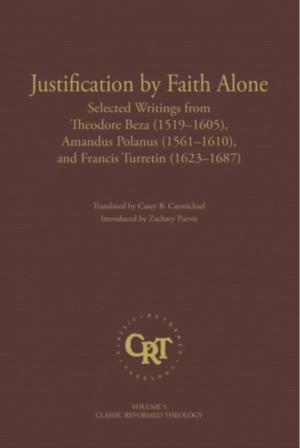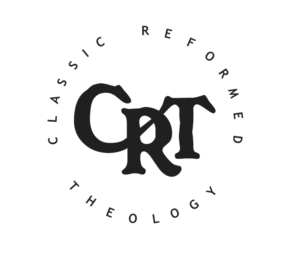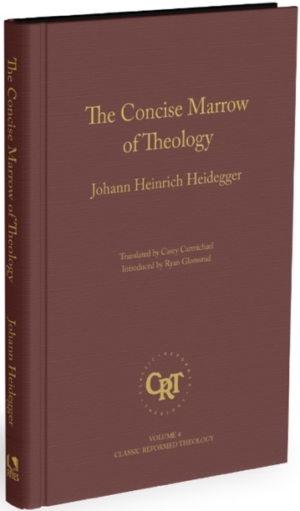For the month of August, 2024, Reformation Heritage Books is giving away copies of the electronic (e-book) version of R. Scott Clark and Casey Carmichael ed. Justification By Faith Alone: Selected Writings From Theodore Beza (1519–1605), Amandus Polanus (1561–1610), and Francis Turretin . . . Continue reading →
Classic Reformed Theology
Back In Print: Olevianus On The Apostles’ Creed
Caspar Olevianus, An Exposition of the Apostles’ Creed, trans. Lyle Bierma, Classic Reformed Theology Vol. 2 (Grand Rapids: Reformation Heritage Books, 2010). Introduction by R. Scott Clark. Caspar Olevianus (1536–87) is most well known today for his role as one of the authors . . . Continue reading →
After Calvin: Recommended Reading
There is a popular view of church history that tells a story in which there was a pure, believing church during the apostolic age and then, for all intents and purposes, there was not a church (except for the Waldensians who alone . . . Continue reading →
Van Asselt On Why Confessional Reformed Seminaries Matter
The Academy of Geneva was established in 1559 under politically difficult circumstances. Especially under Theodore Beza (1519–1605), who was also instrumental in the creation of two chairs of law in 1566 and a chair of medicine in 1567, the academy flourished and . . . Continue reading →
Beza: Sanctification Flows From Christ Whom We Apprehend By Faith
But although sanctification flows forth from the same Christ seized by faith, and leads us to the same place, namely the attainment of eternal life, it would nevertheless be mere madness to add something to the most perfect righteousness of Christ to . . . Continue reading →
Beza: Justification Through Faith Alone Is Shared By All The Lutherans And All The Reformed
If there is any head of Christian doctrine about which it is absolutely necessary to agree to obtain eternal life, it is that in which it is taught not only concerning the righteousness which is required of us before the judgment-seat of . . . Continue reading →
Hot off the press! Beza, Polanus, and Turretin On Justification By Faith Alone
For the first time ever in English, the Classic Reformed Theology Series is proud to present a treatise by Theodore Beza (1519–1605), a section from the Syntagma of Amandus Polanus (1561–610), and an academic disputation by Francis Turretin (1623–1687) on the doctrine of justification. Continue reading →
Review: Petrus van Mastricht’s Theoretical-Practical Theology Volume 3: The Works of God and the Fall of Man
Although it is bad practice to believe in golden ages in the absolute sense, the present is certainly a high point for the church in the specific sense of the English-speaking world gaining increasing access to rich material from Protestant Orthodoxy that . . . Continue reading →
UPDATED Coming In 2023: Beza, Polanus, and Turretin On Justification By Faith Alone
For the first time ever in English, the Classic Reformed Theology Series is proud to present a treatise by Theodore Beza (1519-1605), a section from the Syntagma of Amandus Polanus (1561-1610), and an academic disputation by Francis Turretin (1623-1687) on the doctrine of justification. Continue reading →
Discounted To $2.99: The Kindle Version Of Olevianus’ Exposition Of The Apostles’ Creed
It is good to see evangelicals rediscovering the Great Christian Tradition, i.e., the broad stream of ecumenical (universal) Christian truth represented by the ecumenical creeds. The confessional Reformed churches, however, have always, from the beginning of the Reformation, been aware of and . . . Continue reading →
Coming In December, 2022: Beza, Polanus, And Turretin On Justification
From its inception, the goal of the Classic Reformed Theology Series from Reformation Heritage Books (sponsor of the Heidelcast) has been to present, in English, primary source texts in Reformed theology. This new volume is the sixth in the series, which began . . . Continue reading →
Reminder: Please Subscribe The English Translation Of Polanus
Amandus Polanus (1561–1610) was a theologian and Professor of Old Testament in Basel. He produced one of the most important systematic theologies of the early orthodox period. It has never been translated into English. There is, however, a publisher willing to take . . . Continue reading →
Office Hours: Introducing Rollock’s Commentary On Ephesians
One of the goals of Office Hours is to let the listener know about the work of the faculty in the classroom and in the study. For more than a decade I have had the privilege of editing a series of English . . . Continue reading →
“Bearing with one another in love”: Robert Rollock on Ephesians 4:3
We owe a debt of gratitude to Reformation Heritage Books and General Editors, R. Scott Clark and Casey Carmichael, for the latest publication in their “Classic Reformed Theology” series, Robert Rollock’s Commentary on Ephesians.
Classic Reformed Theology Series Volumes 1–5
New In Print: Robert Rollock On Ephesians
Robert Rollock (1555–99) was one of the most significant Reformed theologians in Scotland in the late sixteenth century. He was an important figure in the development of Reformed covenant theology. He received Calvin’s theology and was especially influenced by Caspar Olevianus (1536–87) . . . Continue reading →
Back In Print! Ames On The Heidelberg Catechism And Caspar Olevianus On The Apostles’ Creed
William Ames, A Sketch of the Christian’s Catechism. Classic Reformed Theology. Todd Rester, trans. (Grand Rapids: Reformation Heritage Books, 2008). Ames (1576–1633) exposits a particular text of Scripture that supports the main thoughts for a given Lord’s Day in the Heidelberg Catechism . . . Continue reading →
Heidegger: Good Works Are Necessary As Fruit And Evidence Of Faith
VIII. New Obedience; Good Works New obedience is exercised through good works. Moreover, there are good works, voluntary actions of the sanctified, which come from a pure heart, love of God, true faith in Christ, according to the law of God, for . . . Continue reading →
Classic Reformed Theology Series
The Reformed faith has deep roots in the patristic and medieval church, but its emergence as a distinct tradition, growing out of the Lutheran Reformation, may be traced to the early 1520s. The development of Reformed theology as distinct from Lutheranism is . . . Continue reading →
New In Print: J. H. Heidegger’s Concise Marrow Of Theology
J. H. Heidegger (1633–98) was a significant Swiss Reformed theologian, in Zürich, at the end of the 17th century. This volume is a clear, accessible introduction to Reformed theology. It is not technical. It was meant to be a starting point and . . . Continue reading →












